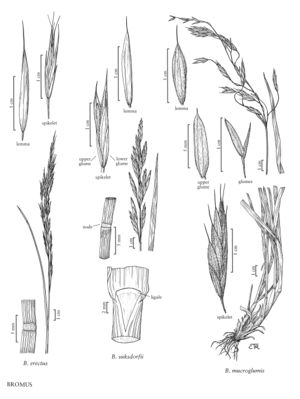Bromus mucroglumis
Plants perennial; not rhizomatous. Culms 50-100 cm, erect or spreading; nodes 5-7, pilose or pubescent; internodes glabrous. Basal sheaths pubescent or pilose, throats pilose; upper sheaths pubescent or glabrous, midrib of the culm leaves not abruptly narrowed just below the collar; auricles absent; ligules 1-2 mm, glabrous, truncate or obtuse; blades 20-30 cm long, (4) 7-11 mm wide, flat, both surfaces pilose or the abaxial surface glabrous. Panicles 10-20 cm, open, nodding; branches ascending or spreading. Spikelets 20-30 mm, elliptic to lanceolate, terete to moderately laterally compressed, with 5-10 florets. Glumes usually pilose or pubescent, rarely glabrous; lower glumes 6-8 mm, 1-veined; upper glumes 8-8.5 mm, 3-veined, mucronate; lemmas 10-12 mm, elliptic to lanceolate, rounded over the midvein, backs and margins pilose or pubescent, apices acute to obtuse, entire; awns 3-5 mm, straight, arising less than 1.5 mm below the lemma apices; anthers 1.5-3 mm. 2n = 28.
Distribution
Ariz., N.Mex.
Discussion
Bromus mucroglumis grows at 1500-3000 m in the southwestern United States and northern Mexico.
Selected References
None.
Lower Taxa
"decumbent" is not a number.
